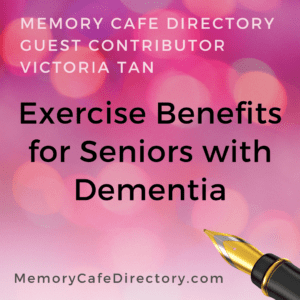Memory Cafe Directory posts and/or links to retailers can be advertising, sponsored, or affiliate links. We may earn a small commission from them. Thank you.
For both mental and physical health, exercise is extremely beneficial for everyone – especially seniors with dementia. Even for those in all stages of dementia, it can actually help to improve their quality of life.
What do “physical activities” consist of? They are frequently defined as those that cause you to breathe deeper and increase your heart rate. This can even include activities that many people do every day such as the following:
- Dancing
- Gardening
- Walking
However, with the aim of improved fitness in mind, it may also include focused exercises, as well as playing sports. The available exercises for seniors with dementia are many and should not be ignored under any circumstances. For people with cognitive conditions, physical activity is crucial – no matter the stage of their condition.
The level of activity that is appropriate should be taken into consideration. After determining what is and isn’t fitting, exercises and activities can then be participated in, according to their appropriateness.
So important is physical activity to both the mental and physical health of those in their golden years, that today’s retirement communities with Memory Care options include specific programs geared toward it. They may be referred to as health and wellness programs, exercise programs, physical therapy programs, and more.
Physical Activity, Exercise, and the Benefits
To maintain well-being, a healthy lifestyle must include regular physical exercise – regardless of age or level of dementia present. Valuable benefits are created by physical exercise including the opportunity for socialization. A person’s independence can be both improved and maintained courtesy of physical activity and interaction with others.
Mood and self-esteem can also improve by participating in physical activities. This, in turn, may contribute to well-being because it encourages more social engagement.
How to Get Started
What should be used to determine the appropriateness of exercises and activities in which a retiree may or may not participate?
- The preferences and needs of the individual
- Type/stage of dementia
- Abilities of the person in question
- Age of the individual
It’s not a bad idea to seek out medical advice if a person with dementia is going to pursue an exercise regime for the very first time. If any of the following conditions exist, this is particularly important:
- Frequent falls
- Balance problems
- Breathing issues
- Joint or bone problems that may be made worse by exercise
- Fainting or dizziness
- Inexplicable chest pain
- High blood pressure
- Heart problems
Exercise may not be completely ruled out, even if some of the above conditions exist. Medical advice is always recommended. However, some people may actually see improvements where these conditions are concerned, once they start exercising appropriately and regularly.
It’s important for the person in question to enjoy the exercises and/or activities, as well as for the exercises/activities to be suitable. Exercising can be done in a small group, with one-on-one supervision, or individually – depending on the person in question. To see what suits a person best, sometimes several activities must first be tested out.
Dementia Stages and Appropriate Exercises
As stated earlier, no matter the stage of dementia, there are physical activities and exercises that can be appropriate. Below, we will look at exercises for individuals living with dementia in the later stages of the condition, and then for those in the middle stages of dementia.
Late-Stage Dementia Activity
From person to person, the ideal amount of exercise will vary. The question of exactly what’s appropriate has no definitive answer. Those in dementia’s later stages should be encouraged to change chairs and move about regularly, for instance, when enjoying a meal or a drink.
On a daily basis, and with supervision, they should sit unsupported for as long as can be tolerated. To help maintain joint flexibility and muscle strength, they should be moving around the home as part of a daily routine. This also helps to maintain good balance.
Specific exercise/activity suggestions:
- For 20 to 30 minutes per day, lie as flat as possible working to reduce the gap between the mattress and the curve of the back.
- For several minutes each day, sit unsupported.
- In a standing position, work on balance. If necessary, for support, the person can hold onto something such as the back of a sturdy chair or countertop.
- When going to bed or getting up, in the sitting position, shuffle along the edge of the bed from one end to the other.
- Again, the whole point here is to maintain good balance and keep muscles strong by regularly rising to a standing position and moving about the house.
Middle Stage Dementia Activity
Physical activity and organized exercise sessions can frequently be found in retirement communities, local sports centers, community centers, etc. Some of the activities included may consist of swimming, dance, tai chi, seated exercises, ball games, and more.
To a certain point, in the comfort of their own home, individuals may also be able to participate in these exercises. Good forms of everyday physical activity include the motions one goes through during housework, gardening, and walking.
How much activity is appropriate?
Again, from person to person, this will vary, so there’s no definitive answer. However, roughly 150 minutes per week of moderately strenuous physical activity is recommended by the Department of Health.
This doesn’t mean a person has to participate in all 150 minutes at one time. Short sessions – lasting at least 10 minutes each – can be used to break up that 150 minutes throughout the week.
Specific exercise/activity suggestions:
- Walking – This can be done individually, with a partner, or in a group. Walks are sometimes put together/sponsored by organizations such as community centers. Varied fitness levels can be catered to by varying walk durations and distances. In a pinch, it can even be done on a treadmill in the person’s home.
- Tai chi – With the aim of improving health and balance, meditation and simple physical movements are combined in gentle Chinese martial arts such as tai chi. A series of integrated exercises are involved in the concentrated movements.
- Swimming – For those with dementia, another good activity is supervised swimming. Many individuals find they are calmed and soothed by the sensation of being in the water.
- Dance – Group sessions, couples dancing, tea dances, etc., can be included here. Improvised movements can also be included such as the use of balls, balloons, ribbons, etc. Even in the seated position, people can “dance”. In general, dance is an enjoyable social activity and a great method of exercise.
- Gardening – Once again, this can be done as an individual or in a group. According to each person’s capabilities, activity levels can vary. Pruning, weeding, etc. requires less exertion, while mowing the grass, raking, etc. are more strenuous.
Seated Exercises
These are exactly what they sound like. They are appropriate for those who may have balance issues or trouble standing for lengthy periods of time.
While sitting in a chair, the following activities can be pursued:
- Practice moving repeatedly from standing to sitting
- Arm circles
- Bicycling with the legs
- Raising the legs (one at a time) and clapping underneath them
- Leg bends
- Raising the opposite leg and arm
- In a motion going toward the ceiling, raising both arms (one at a time, together, or alternate both)
- Raising toes and heels
- From side to side, turn the upper body
- “Marching” while seated
Most Important Takeaway
Whether in a Memory Care focused retirement community, at the person’s house, in a community center, or at some other location, it’s important for individuals diagnosed with Alzheimer’s, dementia, or other cognitive issues to keep physically and mentally active as much as possible – for as long as possible.
About the Author
 Victoria Tan is the Marketing Assistant for TerraBella Marchbanks in Anderson, South Carolina.
Victoria Tan is the Marketing Assistant for TerraBella Marchbanks in Anderson, South Carolina.
Become a Contributor!
 Do you want to be a Memory Cafe Directory contributor?
Do you want to be a Memory Cafe Directory contributor?
If you have helpful information to share with our community, read about the guidelines, then get in touch to discuss what you have to offer.
Thank you.





